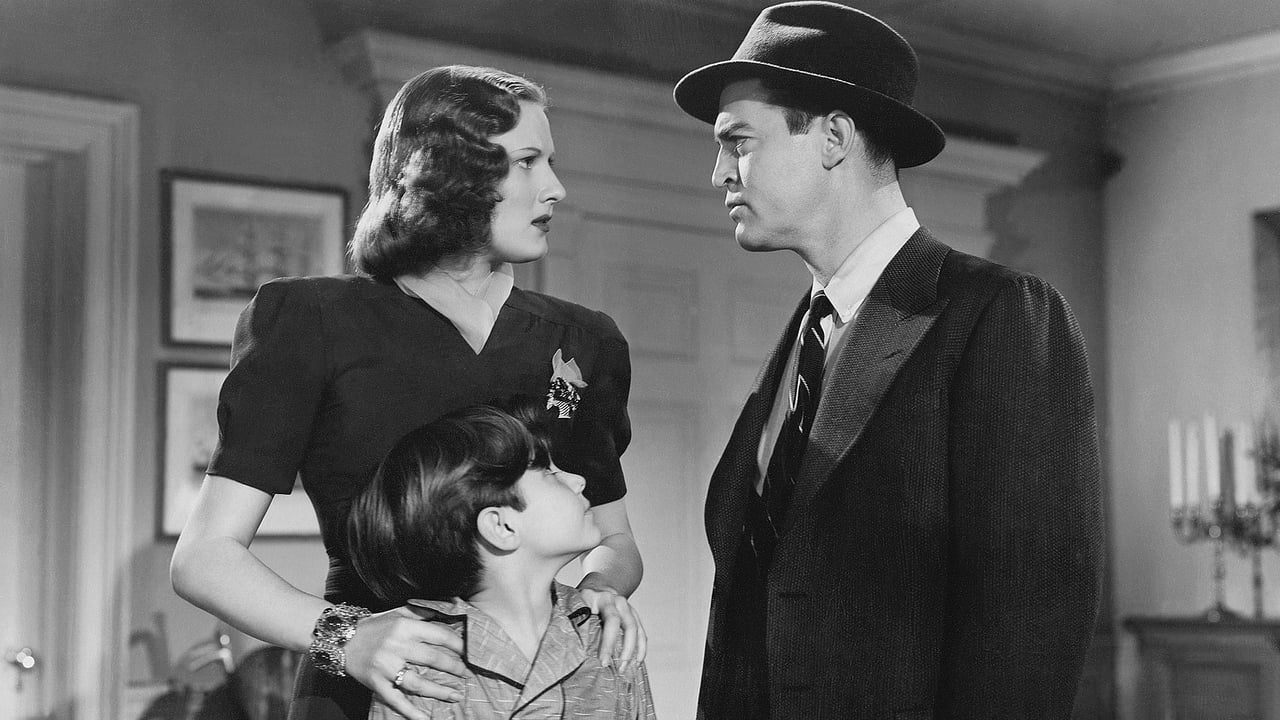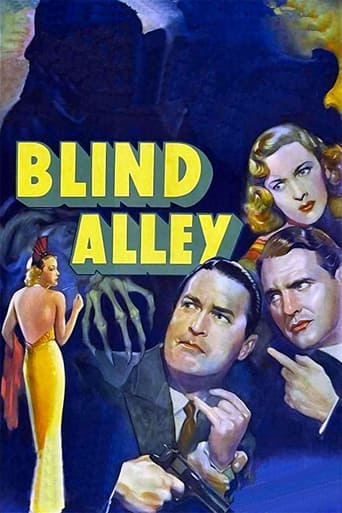Billie Morin
This movie feels like it was made purely to piss off people who want good shows
Rosie Searle
It's the kind of movie you'll want to see a second time with someone who hasn't seen it yet, to remember what it was like to watch it for the first time.
Nicole
I enjoyed watching this film and would recommend other to give it a try , (as I am) but this movie, although enjoyable to watch due to the better than average acting fails to add anything new to its storyline that is all too familiar to these types of movies.
Brooklynn
There's a more than satisfactory amount of boom-boom in the movie's trim running time.
snollen63
Based on a 1935 Broadway success, this film presents an early "psychological" approach to depicting a cold-blooded criminal, here played by Chester Morris, an excellent and very versatile actor, ably supported by a fine cast including Ann Dvorak and Ralph Bellamy. My wife, Yuyun Yuningsih Nollen, and I are currently writing the first-ever book on Chester Morris, which hopefully will correct any oversights that have been made about this performer and introduce a new generation of classic film fans to his extensive body of work, on film, television and radio. Morris also was a well-respected star on stage, following in the footsteps of his father, William Morris, and sharing the profession with his younger brother, Adrian, who unfortunately died far too soon.
bkoganbing
When I wrote a review of the remake of Blind Alley that starred William Holden I had not yet seen this nor had investigated the Broadway play from where this film came from. I've come to some interesting conclusions as a result.Chester Morris plays the killer role in Blind Alley which is a combination of The Petrified Forest and The Desperate Hours and the viewer will recognize parts of both those classics. Morris and his gang are on the run having just busted out of prison where they took the warden hostage and Morris kills him. He then takes refuge at the lakeside home of Ralph Bellamy and wife Rose Stradner who happen to be entertaining guests at the time.Bellamy is a psychiatrist who teaches and after Morris coldbloodedly murders Stanley Brown one of his students he thinks the only way to save his and everyone else's lives is to get into his head. Bellamy is a cool customer doing this, especially with friends and family's lives at stake. When Lee J. Cobb played the part of the psychiatrist in The Dark Past he was detached almost clinical in the way he probed at Holden. Bellamy is not looking at this as an experiment and now having seen both films I can say Bellamy's interpretation was superior.Blind Alley originated as a play on Broadway by James Warwick with a 119 performance run in the 1935-36 season. Looking at that cast I saw that George Coulouris played the psychiatrist and this is one instance where we are so unfortunate that he did not do either movie version. Coulouris would really have been special in the part.This film is a real sleeper from Columbia Pictures, don't miss it if ever broadcast again.
Neil Doyle
This B-film from the late thirties can probably be considered way ahead of its time, dealing as it does with a psychiatric solution for the climax of the story. Hollywood would go much further with such themes in the '40s with the advent of films like "Spellbound", "Possessed" and "The Snake Pit".RALPH BELLAMY is a pipe-smoking psychiatrist with a calm, cool demeanor who appears undisturbed when a psychotic serial killer (CHESTER MORRIS) and his gang intrudes on family and friends during a quiet holiday weekend. When Morris turns out to have bad dreams, psychiatrist Bellamy goes to work tracing the events that trigger the nightmares. Director Charles Vidor uses reverse negative images imaginatively to depict the dream sequence which movie buffs can immediately solve without any explanations from Bellamy.ANN DVORAK is the gun moll acting tough with the house guests and confining the servants to the cellar, and MARC LAWRENCE is effective as one of the tough guys. MELVILLE COOPER has a role in which he's unusually heroic a year after playing the cowardly sheriff in "The Adventures of Robin Hood". SCOTTY BECKETT is a lively presence as the little boy who talks back to the bad men.But the pat solution is too simplistic and the fact that Morris is willing to even listen to Bellamy's sermonizing and psychiatric talk makes the whole thing quite unrealistic. The remake with William Holden had the same problem and the same glaring faults. Another distraction is CHESTER MORRIS who seems to be chewing the scenery in his over-the-top impersonation of the psychotic killer.
Robert J. Maxwell
A couple of gangsters, led by Chester Morris and his moll, Anne Dvorak, invade the very proper and bourgeois vacation lodge of psychiatrist Ralph Bellamy and his guests, and they take the place over while waiting either for a chance to escape or a chance to shoot it out with the cops.I'll tell you something. Chester Morris couldn't have stumbled into a wronger place. The tweedy, pipe-smoking, unflappable Ralph Bellamy pegs Morris immediately as a Freudian delight. To pass the hours away, between chess games, Bellamy beings to probe Morris, gently. Why, for instance, does Morris have those hysterically paralyzed fingers? Why does he have that recurring dream about rain dripping through the hole in his umbrella? At first, Morris reacts irritably to all this "screwy" stuff. "You're screwy!", he tells Bellamy. Everything Morris, in his ne plus ultra gangsta mode, does not understand, he calls "screwy." That renders just about everything in Bellamy's greater vicinity "screwy" because Morris understands nothing of what's going on.Bellamy helpfully draws him a sort of a cartoon, illustrating the mind, according to the received wisdom of 1939. You see, this is the inside of your head. And up here is the conscious mind -- everything you know about. But down here is what we call the unconscious, the bad stuff that the conscious mind wants to forget about. There's a guardian that keeps the unconscious down where it belongs, called "the censor band." But -- are you taking notes? -- but sometimes the censor weakens, as when we fall asleep, and some of the unconscious memories and desires can creep out in disguised form and show up in our dreams. Or sometimes the forbidden memories take the form of physical symptoms, such as paralyzed hands or fingers. The wind up is that Chester Morris is cured in sixty-nine minutes by Ralph Bellamy. He'll never shoot another gun.Actually, Bellamy's explanation of psychoanalysis according to Freud isn't badly presented. I'm glad he stuck with Freud and only two levels of consciousness. If he had ever gotten into Carl Jung, who split up the personality into so many overlapping and contradictory parts that they could have spread out and still filled up the heads of a dozen ordinary neurotics -- well, the audience would have been afloat in a world of some sticky dualistic excreta.At that, though, the movie was probably interesting and educational in 1939, the year of Freud's death. Psychoanalysis was about at its peak and there may have been a certain public curiosity about just what was going on. This answers the question, though it does so in the same way that the Catholic catechism explains the mysteries of the world. "Who made the world?" "Freud made the world." A bit more than a decade later, it was remade almost shot-for-shot as the noir-sounding "The Dark Past," with William Holden running around and calling everybody "screwy." Holden is a more versatile actor than Chester Morris, but this role is so stereotyped that Morris and his clipped sneer are preferable. Still, it's of interest in reflecting certain interests, not just of 1939 or 1950, but of more enduring value. After all, Freud practically invented the subconscious single-handed, and without our grasp of psychodynamics, would we have the efficient marketing we have today of Viagra and SUVs and politicians?

